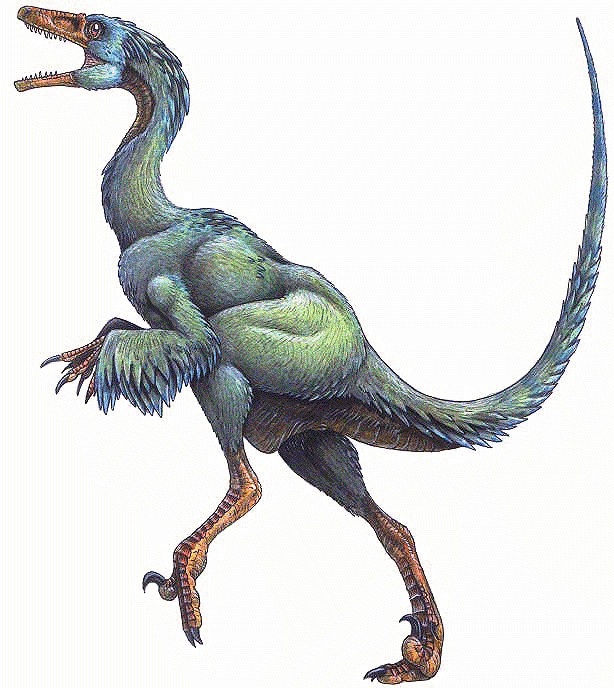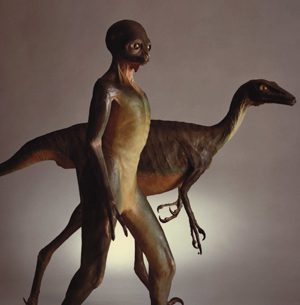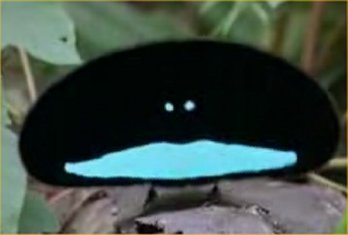Troodon: Sentient Dinosaur?
Troodon (pronounced true-o-don was once called
Stenonychosaurus) was first discovered in 1856, and our
understanding of this relatively small dinosaur has evolved
significantly. The first bit found was a tooth, and at first, it was
thought it came from a lizard. When more of it was discovered, our
perception of this creature evolved from a sluggish lizard to an agile
theropod. Lately, Troodons are depicted covered with downy feathers.

Troodon had three-fingered claws that were opposable and could grasps
objects. Its big eyes were arranged in front, stereoscopically.
While it had all the weaponry of a meat-eater, its teeth suggest that
it may have been omnivorous. Raptors, and many other mid-size
meat-eaters, hunted in packs, and Troodon probably did as well.
Troodon babies and eggs have been found with the body parts of other
dinosaurs that the Troodon parent had brought to the nest (see
this article for additional details).
It also had one of the largest brain-body ratios of any dinosaur
(comparable to an emu). For these reasons, Dale Russell suggested that
if dinosaurs had not become extinct, Troodon could have evolved into
the dominant sentient species instead of humans. In Russell's mind,
they would have evolved to look like humans.
Question 1
Let's suppose Troodon survived the 65mya extinction and continued to
evolve. Would they look like Russell's dinosauroid … that is, a
blend of dinosaur and human-like features?
I  Dale Russell's Dinosauroid Evolution
guess that begs the question of whether sentience induces smaller
mouths and noses and features similar to humans.
Dale Russell's Dinosauroid Evolution
guess that begs the question of whether sentience induces smaller
mouths and noses and features similar to humans.
Question 2
While there are many similarities to us, my next question is… what does it
take to be the dominant sentient species on Earth?
Obviously, the answer is our brains, but what does it take to evolve a
overly-large brain. Nerves were evolved soon after the first
multi-celled animals since it formed a faster cell-to-cell
communication than the old fashioned chemical responses. Brains came
about to coordinate some of this. But brains are costly to an animal,
so they have to … uhm, carry their own weight, so to speak.
Brains have clearly proved useful, as many species have them, but
only to a limited level, beyond which, they aren't as useful as the
resources and nutrients they require.
I mean, brains don't need to be so big as ours to prove useful enough
for an animal's survival, and something large enough to induce
sentience, seems too much. Which is probably why only one species has
one this large. But what are the criteria for evolving overly-large brains?
One theory is our weaknesses. Early humans lacked claws, teeth,
armor, etc. We didn't have either offenses or defences, and so we
compensated by adding cranial capacity, which in turn, built tools to
hunt and strategy to defend itself.
Troodons had the raptor's retractable sickle-shaped terrible claw,
which made is a formidable predator. If it had all the accessories
necessary for survival, it may not bother evolving a brain. But this
depends on the circumstance. The late Cretaceous had T-Rex and
larger-than-Elephant-sized Triceratops, and to avoid larger
predators and to take large creatures down, may require something
more… like a really large brain.
Too bad we killed off all of the other large-brained competitors for
our spot… but that would lead to another question.
Looks like other people have had the same question.
Tell others about this article:

Comment
Just read your latest blog on the Troodon. I found it quite Interesting. I had
not heard of this dinosaur before.
I wonder how much of the human brain has to do with sexual selection (Survival
of the sexiest) more than natural selection (Survival of the fittest.) When you
examine how humans choose a mate, I get the impression that people having more
mental capability (not just smarts, but coordination, wit, humor, linguistic
skill, etc.) appeal to the opposite gender more than those without. There also
seems a bias between genders, to wit, the stereotype of dumb but attractive
blonde seems to immediately imply a female.. One only needs a characteristic to
be adored by a statistically significant portion of the opposite gender, and as
long the negative aspects do not weigh down fitness too much, it would get
selected for over many generations.
So, back to the Troodon. Evolutionary pressures based on sexual selection seem
to follow more the whim of the moment (or era, in this case), than hard core
survival skills. Humans may have their physiques and brains not because they are
the apex of evolutionary trends, but because because their physique matches some
arbitrary preference in the population of the opposite gender If sexual
selection has weight on choosing intelligence, and Troodon had the luck to have
a group of individuals who got really turned on by complex noises, motor
control, and mental gyrations, I can easily see them evolving intelligence on
par with humans. I doubt they would match humans physically though… Maybe the
young chicks would be more apt to swoon over the big dino with lots of back,
ear, and nose feathers -- and a big belly… Hmm… okay, on second thought,
maybe they would not be too far off then.
—Trent Tobler
Comment
 It is always good to hear from you. Your comments are spot-on. But
I would add that sexual attractiveness begins with health … if you appear
sickly, then you obviously are a poor mate. And health implies food, and food
implies fitness.
It is always good to hear from you. Your comments are spot-on. But
I would add that sexual attractiveness begins with health … if you appear
sickly, then you obviously are a poor mate. And health implies food, and food
implies fitness.
Birds have bright plumage solely for impressing the females. Mammals, since
they can't fly away from danger, and instead have to spend a lot of time hiding
and stalking, accordingly tend to be more drab. So I guess the debate is still
open on whether dinosaurs could afford strut like a pimp.
So… once the basic needs are met, then yeah, it becomes nothing
more than psychological preference. I mean, how else did those Bird of Paradise feathers evolve?
And female psychological preference means nothing more than arbitrary. 
—Howard the Author
Comment
Just stumbled over this, and I felt the need to comment a
little. Survival of the sexiest is definetly a thing in evolution
although it does have it ups and downs. E.g. you can become too sexy,
as seen on Megaloceros, the giant deer, that got extinct because it's
sex-symbols had just became too big to cope with a changing
environment (i.e. growing forests after the ice age). However,
concerning the evolution of brains in dinosaurs and humans, there is
one thing that I needed to point out.
If looking at human physiology there is only one other thing coming
anywhere close to the energy demands of the brain; the
intestine. Which in humans is actually reduced a lot if cmpared to
other animals. So the evolution of the brain is coupled to the
devolution of the intestine apparatus. One might argue which came
first, however being a predator definetly helps developing brains, as
the food already contains much more energy, and breaking it up is much
easier.
Well, at some point humans started cooking their food. In such way
predigested food allows the intestines to become reduced, and thus
allows for more energy delivered to the grey matter.
So I wouldn't put it on the "weakness" of humans, esp. given that on
an overall performance, we are actually pretty good predators. But on
a happy accident involving regular bushfires and some scavening
monkeys.
And the very same could have been true for Troodon.
—Torsten Jeske